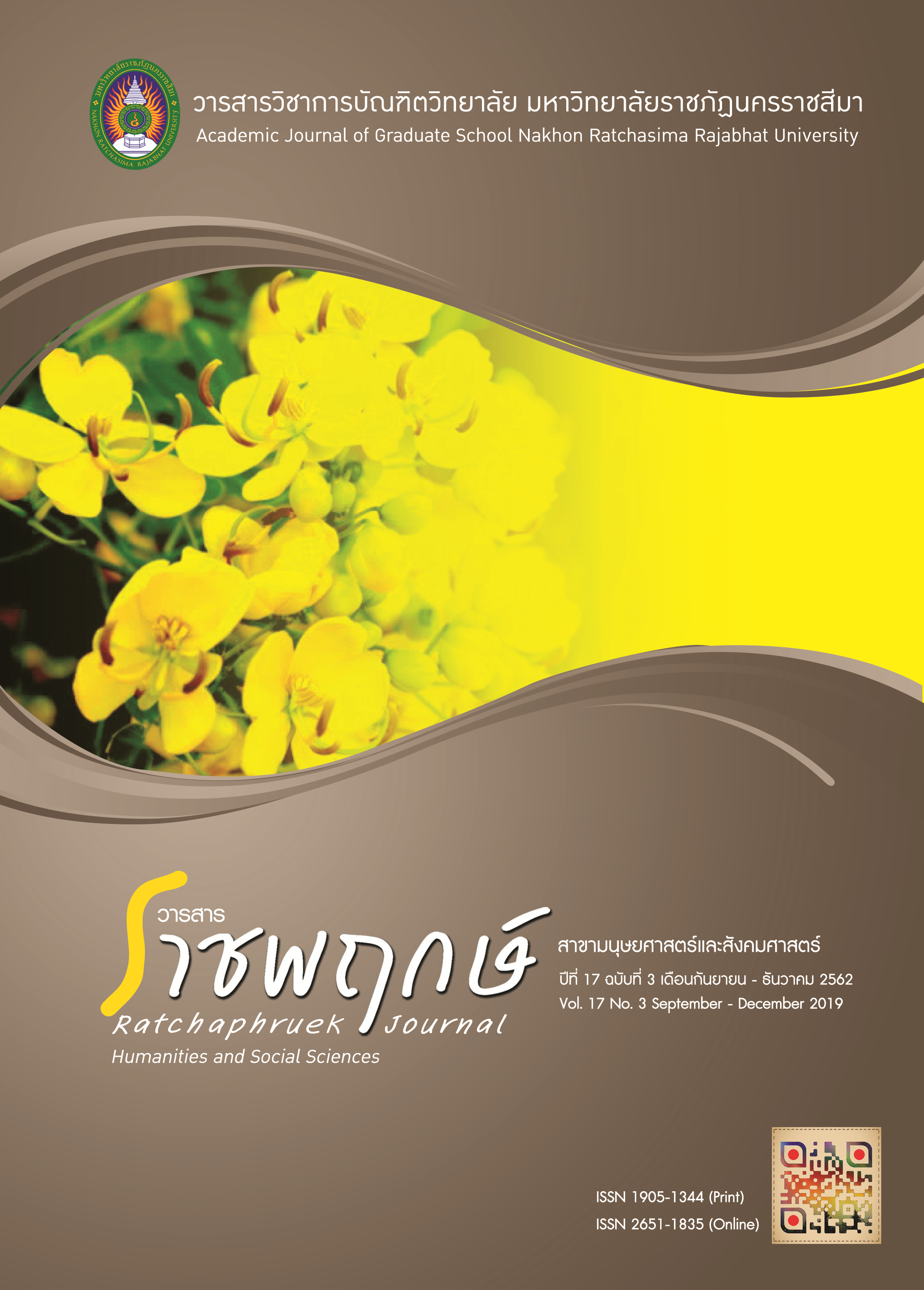English Learning Achievement Development through the Instruction Model Based on Integrated Approach
Main Article Content
Abstract
The purpose of this research was to discover the English learning achievement of the students learning through the instructional model based integrated approach. The experiment was implemented with 2 subject groups of students, selected with purposive selection method, in the second semester of academic year 2016; the first group consisted of 22 students enrolling to study the Skill-Integrated English course and the second groups comprised35 students enrolling to study English for ASEAN Studies course. The instruments were the set contents and the teaching and learning activities of the instructional model based on integrated approach, and English learning achievement test. The statistics used for analyzing the data in the research were percentage, mean, standard deviation, dependent t-test. The results revealed that both subject groups had significantly higher achievement after learning through the instructional model at statistical level .01, the difference of average achievement score between before and after learning was over 30, and the average achievement scores of both groups after learning were over 50%, which was higher than before learning over 30%.
Article Details
References
Candy Cuenca-Dimalanta. (2016). The integrated approach: Giving kids a
meaningful learning experience; Retrieved from (Quality Teacher)
https://diwalearningtown.com/qualityteacher/diwa-innovation-spotlight/Integrated-approachs. (01/03/2014).
Eggen, Paul D. and Kauchak Don. (1999). Educative Psychology: Windows on Classroom.
New Jersery, Prentice-Hall, Inc.
Eggen, Paul D. and Kauchak Donald P. (2001). Strategies for Teachers: Teaching Content
and Thinking Skills. Boston, Allyn and Bacon.
Gagne, Robert M. and Briggs, Leslie J. (1974). Principles of Instruction Design. New York, Holt,
Rinehart and Winston.
Gagnon Jr., George W. and Collay, Michelle (2000). California, Designing for Learning. Corwin
Press, Inc.
Gredler, Margaret E. (1992). Learning and Instruction: Theory into Practice. New York,
Macmilan Publishing Company.
Hamilton, Richard and Ghatala, Elizabeth (1994). Learning and Instruction. McGraw-hill, Inc.
U.S.A.
Harmer, J. (2007). ‘Teaching language skills,’ The practice of English language teaching, 4th edn, Pearson Education, Harlow.
Harmer, Jeremy (1998). How to teach English. Harlow, Addison Wesley longman Limited.
Harmer, Jeremy (1998). The Practice of English Language Teaching. Harlow, Pearson
Education Limited
Heidi Hayes Jacobs. (1989). Interdisciplinary Curriculum: Design and Implementation. Retrieved
From https://www.amazon.com/Interdisciplinary-Curriculum-Heidi-Hayes-
Jacobs/dp/0871201658. (15/05/2014).
Hui-fang Shang. (2006). The Internet TESL Journal, Vol. XII, No. 11, November 2006; Retrieved
from https://iteslj.org/Techniques/Shang-CBI.html.
Idaryani. (2017). INTEGRATED APPROACH IN TEACHING-LEARNING
ENGLISH. Proceedings of ISELT FBS Universitas Negeri Padang:
Joyce, Bruce and Weil, Marsha. (1996). Models of Teaching. Boston, Allyn and Bacon.
Manyasi. (2014). N. Beatrice (PhD) Maasai Mara University School of Arts and Social Sciences,
P.0. Box 861- 20500, Narok, Kenya Email:beatomanyasi@yahoo.com; Cell phone:
+254721883793; retrieved from https://www.ijern.com/journal/April-2014/24.pdf
Norton, B, & Toohey, K. (2002). ‘Identity and language learning’, in RB Kaplan (ed), The Oxford handbook of applied linguistics, Oxford University Press, pp. 115-23. In learning global English in diverse social context, Study guide and readings, Deakin University, Victoria.
Nunan, D. (1991). ’Communicative tasks and the language curriculum,’ TESOL Quarterly, vol. 2, pp. 279-95.
Peachey, Nit. (2017). Content-based Instruction. The British Council: Retrieved from
https://www.teachingenglish.org.uk/article/content-based-instruction.
(20/03/2017).
Rachel A. Quero (2001, "ESL Magazine," Vol. 6, No. 1, January/February 2001)
Schutz, Ricardo (March3, 2002). Vygotsky & Language Acquisition. Retrieved from
https://www.sk.com.br/sk-vygot.html. (11/08/2003).
Slavin, Robert E. (1994). Educational Psychology. Massachusetts, Allyn and Bacon
Sriraungrith, Preecha. (2010). The Development of the Communicative English Instruction
Model for Phetchabun Rajabhat University Students. Research, Petchabun Rajabhat
University.
Sriraungrith, Preecha. (2014). The Study of English Learning Achievement of the Students
Learning through the Integrated English Instructional Model for Undergraduate
Students. Research, Petchabun Rajabhat University.
Sriraungrith, Preecha. (2015). The Study of the Effects of Implementation of Integrated
English Instructional Model for Higher Education Students. Research, Phetchabun
Rajabhat University.
The Internet TESL Journal, Vol. IX, No. 2, February 2003: Retrieved from
https://iteslj.org/Articles/Davies-CBI.html (25/06/2014).
Ur, P. (1996). ‘Teaching writing,’ A course in language teaching: practice and theory, Cambridge University Press, pp. 159-74. In pedagogy in the globalised language classroom, Readings, Deakin University, Victoria.
Van Lier, L. (2000). ’From input to affordance: social –interactive learning from an ecological perspective’, in JP lantolf (ed), Sociocultural theory and second.
Vygotsky, L.S. (1934/1978). Mind in Society: The Development of Higher
Psychological processes. Edited by Michael Cole, Vera John-Steiner, Sylvia Scribner, and Ellen Souberman. ; Cambridge, Massachusetts, London, Harvard University Press.
Vygotsky, L.S. (1934/1962). Thought and Language. Edited and translated by Eugenia
Wan, Yee. (1996). An Integrative Approach to Teaching English as a Second Language: The Hong Kong Case. PUB DATE Jan 96 NOTE 14p.; Paper presented at a Conference on English Language Learning for the 21st Century (Hong Kong, January 1996)
Wells, In G. (1999). Dialogic Inquiry: Towards a sociocultural Practice and Theory of
Education. New York: Cambridge University Press. Retrieved from
https://www.oise. utoronto.ca/~gwells/resources/ZPD.html (06/08/2003).
Wertsch, James V. (1997). Vygotsky and the Social Formation of Mind. Cambridge, Harvard
University Press.
Yasin. (2010). Content-based Instruction for ESL. Replied on 8 October, 2010.
PERMALINK; Retrieved from: https://ejournal.unp.ac.id/index.php/selt/article/view/6778.
(15/03/2015).


